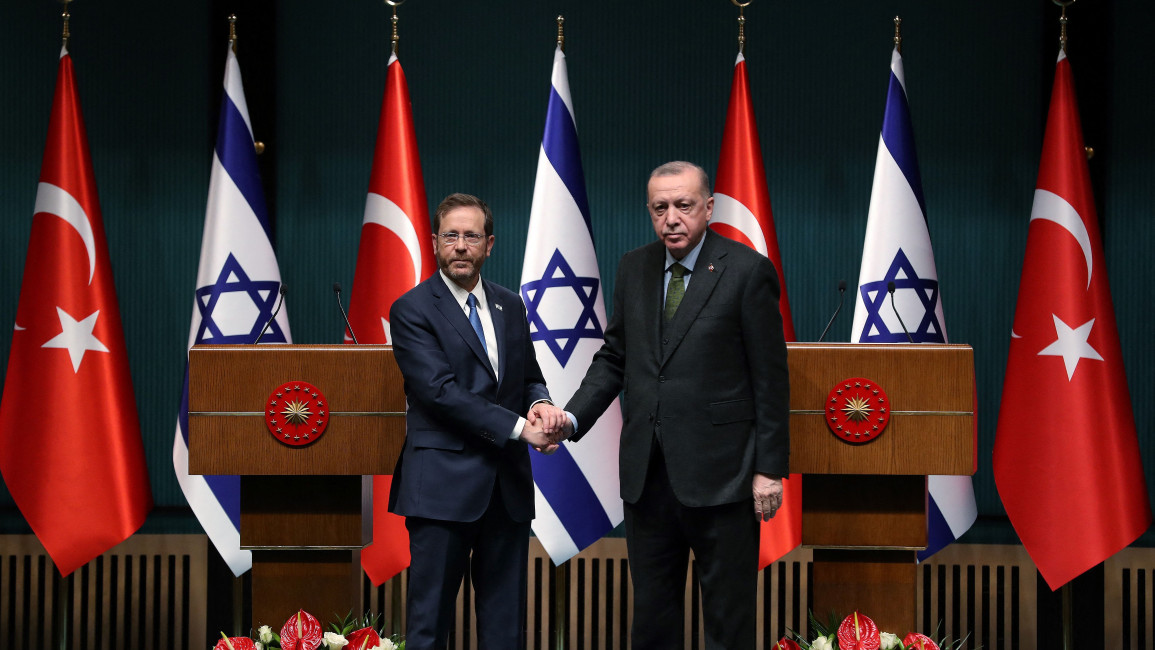Turkish-Israeli rapprochement alarms Hamas: experts
Recent Turkish-Israeli political rapprochement has raised concerns for the Islamic Hamas movement, which has strategic relations with Turkish President Recep Tayyip Erdogan, Gaza-based political experts said on Tuesday.
Two weeks ago, Israeli President Isaac Herzog visited Turkey for the first time after years of tension and met with his Turkish counterpart Erdogan, amid an atmosphere of understanding on developing relations between the two countries.
Following their meeting, both presidents described that their countries are heading towards "a new turning point in relations based on common interests."
Turkey and Israel were once close allies, but the relationship frayed under Erdogan, who is an outspoken critic of Israel's treatment toward the Palestinians, which Amnesty International and Human Rights Watch have said amounts to the crime of apartheid and crimes against humanity.
Turkey broke relations with Israel after a fatal attack by Israeli commandos on a peace flotilla led by Turkish boats in international waters in 2010, killing ten unarmed activists.
As a result, stronger relations developed between Hamas and Turkey, in which the Turkish capital Ankara frequently receives visits from Hamas leaders.
Turkey also allowed Hamas leaders to move freely on its territory after they left Syria in 2012.
Protests break out in #Turkey as #Israeli President Herzog visits https://t.co/O8RSJzhWUf pic.twitter.com/lUQfxCg9rW
— George Mastropavlos (@g_mastropavlos) March 10, 2022
In separate remarks to The New Arab, Gaza-based political experts said that Hamas is "really concerned" about the fate of its relationship with Turkey and its support to the Palestinian cause.
They also noted that Hamas cannot openly criticize Turkey for its actions.
The experts believe that the growing Turkish-Israeli relations may negatively impact the relationship between Hamas and Turkey, mainly as there are a number of prominent leaders and activists of the Islamic movement living in Turkey.
Mukhaimer Abu Saada, a political expert and political professor at Al-Azhar University in Gaza, told The New Arab that Turkey will likely prefer to achieve its political and economic interests with Israel rather than maintain its relationship with Hamas.
"Hamas knows that Turkey is currently suffering from the deterioration of the Turkish lira and the decline of its economy. Its relations with Israel may help it overcome the complicated crisis it is facing,” he said.
"Therefore, there is no doubt that Hamas is concerned that Israel will put pressure on Turkey to expel its leaders from Ankara soon," he said, adding that if this happens, the movement "will look for a new place for its leaders, such Iran or Lebanon."
Abu Saada also noted that Turkey could go as far as imposing major restrictions on Hamas activists residing in Turkey, particularly Palestinian prisoners who were released during a prisoner exchange deal with the Israeli soldier Gilad Shalit in 2011.
For his part, Naji Shurrab, another political scientist in Gaza, told The New Arab that he expect that Turkey may allow Hamas activists to remain in its territory, but it would likely "prevent them from engaging in any tangible political, media or economic activities."
But similar to Abu Saada's analysis, Shurrab also thinks that Hamas "will not have any other choice and will accept any restrictions by Turkey in a bid to gain some time in reconfiguring their political position within that country."
In fact, Turkish officials have recently discussed with the movement's military officials the possibility of their safe departure from Turkey, according to a source close to Hamas, who is based in Ankara and requested anonymity in order to speak freely.
The source added the Turkish officials have already"asked our activists to reduce their political and media activities in their territories while allowing cultural activities at least for the time being."
However, the source further says that Turkish officials have told them that "they will not abandon their position in support of the Palestinian cause and that they will do their best to ease the Israeli siege on the Gaza Strip."
"We do not interfere in the internal relations of any country. We want to maintain a good relationship with all Arab and Islamic countries, especially Turkey,” the source said.



